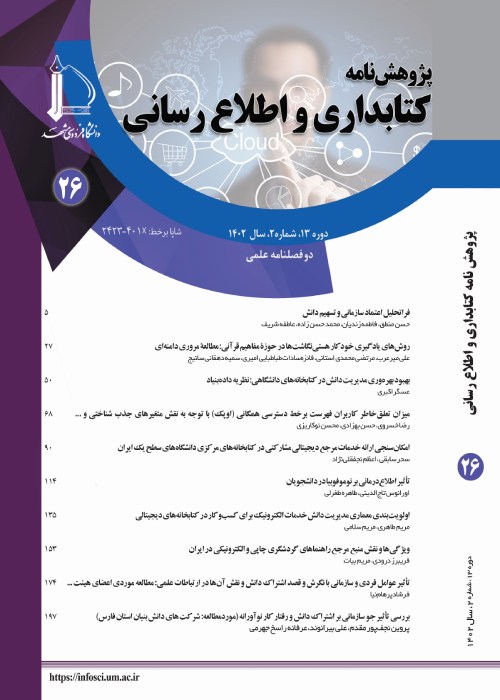The level of User Engagement of the Online Public Access Catalog (OPAC) according to the Role of Cognitive Absorption and Computer Self-Efficacy Variables
University libraries, being at the center of global scientific and research activities, are considered as one of the most dynamic types of libraries. They continuously utilize various technologies and strive to enhance the quality of their services. Therefore, these libraries must seek ways to improve the qualitative level of user interaction with the various operational systems within the libraries. To enhance the quality of user interaction with library systems, it is essential to establish a sense of belonging among visitors. Libraries should strive to have a better understanding of their users' experiences, particularly in areas related to information technology and online catalogs. This improvement aims to enhance the development of technology interaction, provide electronic loyalty, and foster a sense of belonging among users. The main goal of this research is to investigate the role of interactive and individual components such as cognitive absorption and computer self-efficacy in determining the level of user belongingness to the online catalog system of Ferdowsi University of Mashhad Central Library. Research Objectives are:a) To determine the level of user belongingness to the online catalog system of Ferdowsi University of Mashhad Central Library.b) To determine the role of cognitive absorption in the level of user belongingness to the online catalog system.c) To determine the role of computer self-efficacy in the level of user belongingness to the online catalog system.
This research falls into the category of applied research in terms of objectives and utilizes survey and quantitative methods. The study specifically employs a self-report approach using standardized questionnaires to assess components such as user belongingness, cognitive absorption and computer self-efficacy. The statistical population includes all postgraduate students at Ferdowsi University of Mashhad, and the sample size is determined to be 367 individuals. Data collection is carried out through three evaluation questionnaires. To evaluate user belongingness, the UES questionnaire is used, while cognitive absorption and computer self-efficacy are assessed using the Agarwal and Karahanna questionnaire and a standard questionnaire, respectively. The research employs both convergent and discriminant validity for measurement models and Cronbach's alpha for reliability.
Initial examination analysis of the collected data revealed that 54.38% of respondents were female. Regarding age groups, 59.83% were in the 21-25 age group. In terms of educational level, 6.58% were pursuing postgraduate studies. Subsequently, factor analysis was employed to respond to research questions and analysis of the data. Since this research aimed to explore the fundamental variables of a phenomenon (user engagement) by summarizing a set of data to elucidate internal relationships, confirmatory factor analysis was deemed the most appropriate method for data analysis, especially to address the main research questions. Statistical analyses indicated that the level of user engagement with the OPAC (Online Public Access Catalog) of Ferdowsi University's central library was relatively low. Among various components, perceived usability was only at a moderate level, with other components falling below the average. Other findings suggested that cognitive absorption and computer self-efficacy significantly influenced the level of user engagement. Higher levels of these two components were associated with increased user engagement with the central library's OPAC. Upon closer examination of specific components, it was revealed that temporal self-disposition, control, curiosity about cognitive absorption, and basic computer skills had the most significant impact, while other components had less significant effects.
The findings indicated that the level of user engagement with the Online Public Access Catalog (OPAC) was low. This could be attributed to the uniformity of library catalog environments, where interactions with other users (suggestions, feedback, etc.) were not emphasized. Activities such as reviewing photos, updating profiles, etc., had a considerably lesser effect on user engagement. Another reason for users' limited engagement with the library catalog could be the lack of interest and enthusiasm for library topics and content. The findings related to the first part of the research hypothesis demonstrated that each of the cognitive absorption components played a significant role in user engagement. Sub-components such as users' perception of the practicality and ease of use of the library catalog were crucial. It was inferred that if users perceive the utility and ease of use of the library catalog, their engagement with it would increase. Factors affecting practicality include compliance with user needs and ease of use of computerized lists. The findings related to the second part of the research hypothesis also showed that each of the computer self-efficacy components had a significant impact on user engagement. It can be concluded that computer self-efficacy is a crucial factor in user interaction with computer systems, encompassing beliefs and individuals' ability to use computers to solve problems and achieve goals. Higher computer self-efficacy leads to the increased familiarity with new software and tools, resulting in overall better computer performance. It can be inferred that experience in any field can serve as a foundation for subsequent experiences.
- حق عضویت دریافتی صرف حمایت از نشریات عضو و نگهداری، تکمیل و توسعه مگیران میشود.
- پرداخت حق اشتراک و دانلود مقالات اجازه بازنشر آن در سایر رسانههای چاپی و دیجیتال را به کاربر نمیدهد.




